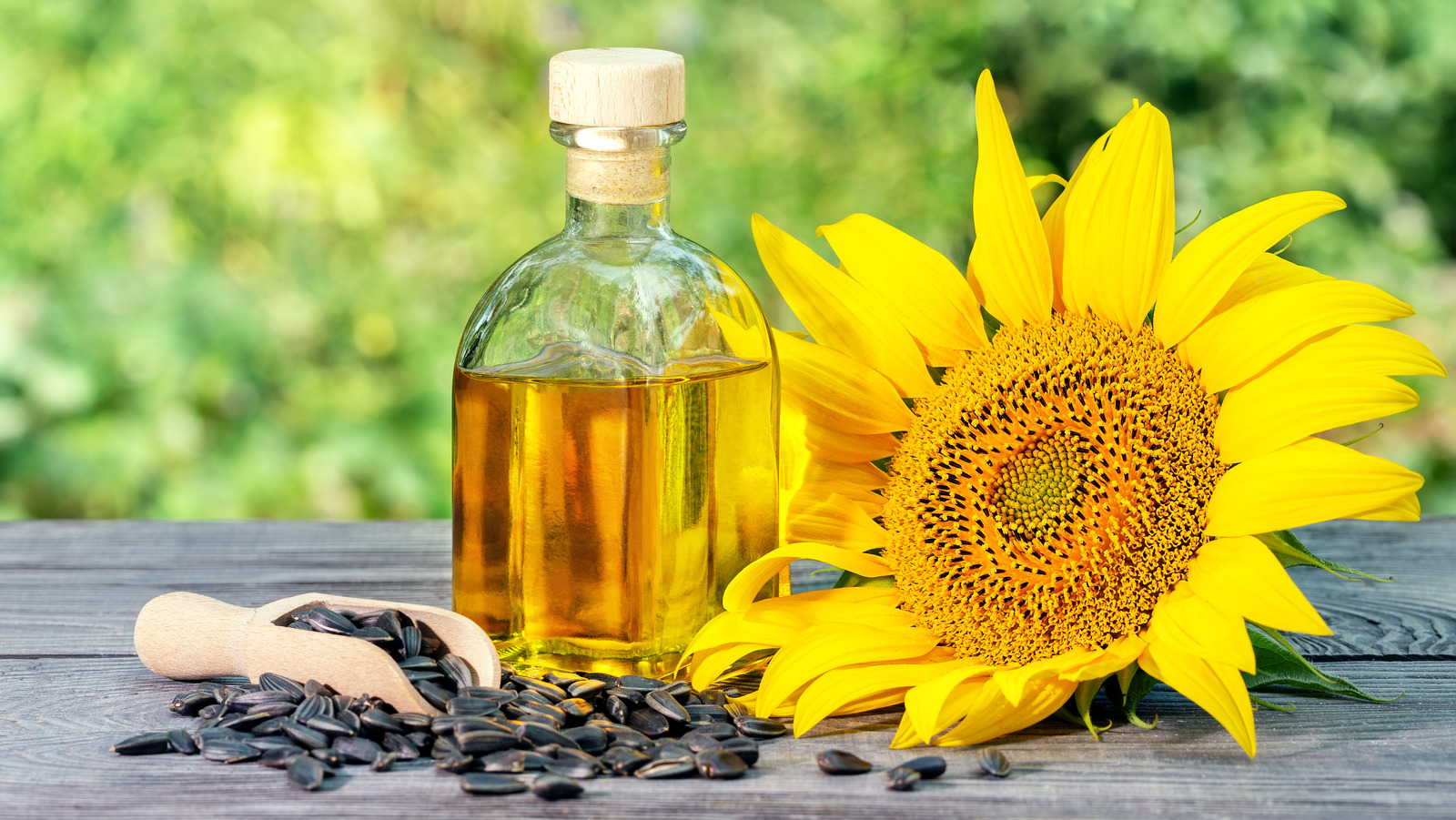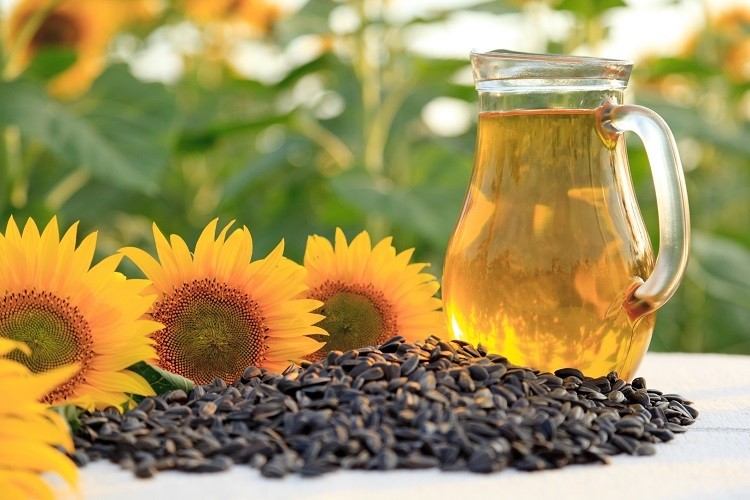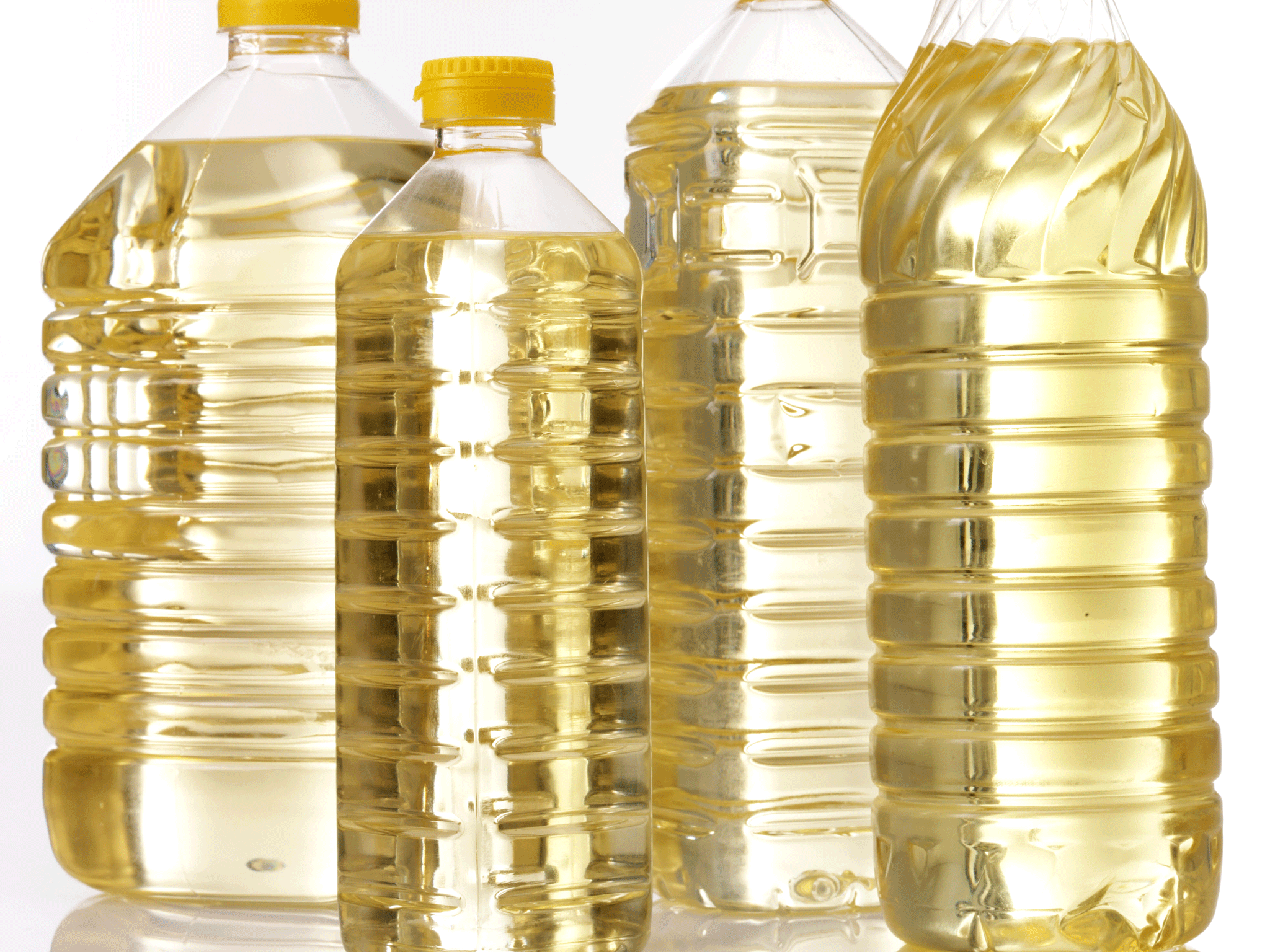
Introduction
Overview Of Sunflower Oil And Vegetable Oil
Sunflower oil and vegetable oil are both commonly used in cooking and are considered as vegetable oils. However, they are not synonymous, as not all vegetable oils contain sunflower oil. Vegetable oils are derived from various sources, including plants, seeds, and nuts. These oils can have different compositions depending on the producer and their intended use. Sunflower oil, on the other hand, is a specific type of vegetable oil that is extracted from sunflower seeds.
Explanation Of The Difference Between Sunflower Oil And Vegetable Oil
The main difference between sunflower oil and vegetable oil lies in their composition. Sunflower oil is exclusively derived from sunflower seeds, while vegetable oil can come from a range of sources. The specific type of vegetable oil used can affect the taste, texture, and nutritional value of the food being prepared.
In terms of taste, sunflower oil has a mild flavor, making it suitable for a variety of dishes. It has a high smoking point, which means it can withstand higher heat without breaking down and producing harmful smoke. This makes it ideal for deep frying.
Vegetable oil, on the other hand, can vary in flavor depending on the plants or seeds from which it is derived. Some vegetable oils may have a stronger, more distinct taste compared to sunflower oil. Its smoking point may also vary depending on the specific blend and quality of oil.
In terms of nutrition, both sunflower oil and vegetable oil provide essential fatty acids and vitamin E. However, the exact nutrient composition may differ depending on the specific oils used. It’s important to read the labels and choose oils that are low in saturated fats and high in healthier unsaturated fats.
In summary, while sunflower oil is a type of vegetable oil, not all vegetable oils contain sunflower oil. Sunflower oil has a mild flavor and high smoking point, making it suitable for deep frying, while the taste and smoking point of vegetable oil can vary depending on the specific blend and source. When selecting cooking oils, consider the specific needs of your recipe and choose oils that align with your health goals.
Sunflower Oil
Characteristics And Benefits Of Sunflower Oil
Sunflower oil is a type of vegetable oil that is exclusively derived from sunflower seeds. It has several characteristics that make it a popular choice for cooking:
- Mild flavor: Sunflower oil has a mild taste, which makes it suitable for a variety of dishes. It doesn’t overpower the flavors of other ingredients and allows them to shine.
- High smoking point: Sunflower oil has a high smoking point, which means it can withstand higher heat without breaking down and producing harmful smoke. This makes it ideal for deep frying, as it can maintain its stability and preserve the quality of the food being cooked.
- Versatility: Sunflower oil can be used for a wide range of cooking methods, including frying, sautéing, and baking. Its neutral flavor makes it a versatile option for different types of cuisine.
Nutritional Value And Health Benefits Of Sunflower Oil
Sunflower oil provides several health benefits due to its nutritional composition:
- Essential fatty acids: Sunflower oil is rich in polyunsaturated fatty acids, particularly linoleic acid. These essential fatty acids are necessary for the body’s functioning and can help reduce the risk of heart disease.
- Vitamin E: Sunflower oil is a good source of vitamin E, which is a powerful antioxidant. This vitamin helps protect cells from damage caused by free radicals and supports a healthy immune system.
- Low in saturated fats: Sunflower oil is low in saturated fats, which are considered unhealthy when consumed in large amounts. By choosing oils low in saturated fats, you can promote heart health and manage cholesterol levels.
It’s important to note that while sunflower oil offers these health benefits, moderation is key. Like any cooking oil, it should be used in moderation as part of a balanced diet. Additionally, it’s recommended to choose high-quality sunflower oil from reputable sources to ensure its purity and nutritional value.
Vegatable Oil
Different Types And Sources Of Vegetable Oil
Vegetable oils can come from various sources and can be a blend of different plant-based oils. Some common types of vegetable oils include:
- Soybean oil
- Corn oil
- Canola oil
- Palm oil
- Olive oil (yes, it is technically considered a vegetable oil)
These oils are extracted from their respective sources, such as soybeans, corn kernels, canola seeds, palm fruit, and olives. Each type of vegetable oil has its own unique characteristics and flavor profiles.
Uses And Culinary Applications Of Vegetable Oil
Vegatable oil has a wide range of culinary applications due to its neutral flavor and high smoking point:
- Frying: Just like sunflower oil, vegetable oil is ideal for deep frying due to its high smoking point. It can withstand the high heat required for frying without breaking down or producing harmful smoke.
- Sautéing: Vegetable oil can be used for sautéing vegetables and meats. Its neutral taste allows the flavors of the ingredients to come through without overpowering them.
- Baking: Vegetable oil is commonly used in baking recipes to add moisture to cakes, cookies, and other baked goods.
- Dressings and Marinades: Vegetable oil can be used as a base for homemade salad dressings and marinades, providing a subtle flavor enhancement.
Overall, vegetable oil is a versatile cooking oil that can be used in a variety of dishes, making it a pantry staple for many home cooks and professional chefs.
Production Process
Methods Used To Extract Sunflower Oil And Vegetable Oil
The extraction process for sunflower oil and other vegetable oils can vary, but there are two commonly used methods:
- Mechanical Extraction: This method involves using mechanical pressure to extract oil from the oilseeds. In the case of sunflower oil, the oilseeds are first cleaned and then pressed to extract the oil. This process leaves behind two products: the nutrient-dense oil and the oil cake, which still contains some oil. The oil cake can undergo further extraction using solvent extraction.
- Solvent Extraction: This method involves using a solvent, such as hexane, to separate the oil from the oil cake. The solvent is applied to the oil cake, which helps dissolve the oil content. The solvent is then evaporated, leaving behind the oil. This method is typically used for oilseeds with higher oil content, such as soybeans.
Impact Of Production Process On Quality And Nutritional Composition
The production process can have an impact on the quality and nutritional composition of sunflower oil and other vegetable oils. Here are some key points to consider:
| Aspect | Mechanical Extraction | Solvent Extraction |
|---|---|---|
| Purity | High | High |
| Nutritional Composition | Retains more natural nutrients | May have slightly lower nutrient content due to potential loss during solvent extraction |
| Presence of Solvents | No | Possible traces of solvents that are removed through evaporation |
| Flavor | Natural flavor retained | May have a more neutral taste |
In conclusion, the production process plays a significant role in determining the quality and nutritional composition of sunflower oil and vegetable oils. Mechanical extraction retains more natural nutrients and has a higher purity level, while solvent extraction may have a slightly lower nutrient content and may contain traces of solvents that are removed through the evaporation process.

Cooking Uses
Recommended Cooking Methods For Sunflower Oil
Sunflower oil is a versatile cooking oil that can be used for various cooking methods. It has a high smoke point, making it ideal for high-temperature cooking techniques such as deep frying, pan-frying, and stir-frying. Its neutral flavor allows it to complement the natural taste of ingredients without overpowering them. Sunflower oil can also be used for baking, as it adds moisture to baked goods and helps create a tender texture.
Ideal Cooking Applications For Vegetable Oil
Vegetable oil, on the other hand, is a more all-purpose cooking oil. It has a neutral flavor and a moderate smoke point, making it suitable for a wide range of cooking applications. Vegetable oil is commonly used for sautéing, roasting, and baking. It can also be used in dressings, marinades, and sauces to enhance flavor and provide a smooth texture. Due to its versatility, vegetable oil is often the go-to choice for many home cooks.
When it comes to deep frying, both sunflower oil and vegetable oil can be used, but sunflower oil is often preferred due to its higher smoke point and better frying performance. It can withstand higher temperatures without breaking down or developing off-flavors, resulting in crispy and evenly cooked food. Additionally, sunflower oil is considered more sustainable compared to vegetable oil, making it a popular choice among environmentally conscious consumers.
In summary, sunflower oil is recommended for high-temperature cooking methods such as deep frying, while vegetable oil is more versatile and suitable for various cooking applications. When it comes to deep frying, sunflower oil’s higher smoke point and superior frying performance make it the preferred choice.
Cooking Uses
Recommended Cooking Methods For Sunflower Oil
Sunflower oil is a versatile cooking oil that can be used for various cooking methods. It has a high smoke point, making it ideal for high-temperature cooking techniques such as deep frying, pan-frying, and stir-frying. Its neutral flavor allows it to complement the natural taste of ingredients without overpowering them. Sunflower oil can also be used for baking, as it adds moisture to baked goods and helps create a tender texture.
Ideal Cooking Applications For Vegetable Oil
Vegetable oil, on the other hand, is a more all-purpose cooking oil. It has a neutral flavor and a moderate smoke point, making it suitable for a wide range of cooking applications. Vegetable oil is commonly used for sautéing, roasting, and baking. It can also be used in dressings, marinades, and sauces to enhance flavor and provide a smooth texture. Due to its versatility, vegetable oil is often the go-to choice for many home cooks.
When it comes to deep frying, both sunflower oil and vegetable oil can be used, but sunflower oil is often preferred due to its higher smoke point and better frying performance. It can withstand higher temperatures without breaking down or developing off-flavors, resulting in crispy and evenly cooked food. Additionally, sunflower oil is considered more sustainable compared to vegetable oil, making it a popular choice among environmentally conscious consumers.
In summary, sunflower oil is recommended for high-temperature cooking methods such as deep frying, while vegetable oil is more versatile and suitable for various cooking applications. When it comes to deep frying, sunflower oil’s higher smoke point and superior frying performance make it the preferred choice.
Smoke Point And Heat Tolerance
Understanding Smoke Point And Heat Stability Of Sunflower Oil
Sunflower oil has a smoke point of 320 °F (160 °C) when unrefined and high oleic, and 428 °F (220 °C) when refined. The smoke point is the temperature at which an oil starts to break down, release smoke, and produce unwanted flavors and harmful compounds. The higher smoke point of sunflower oil allows it to be used for high-temperature cooking methods without reaching its smoke point and compromising food quality.
Heat Tolerance And Appropriate Cooking Temperatures For Vegetable Oil
Vegetable oil has a higher smoke point compared to sunflower oil, ranging from 400-450ºF (204-232ºC). This higher smoke point makes it suitable for a wide range of cooking methods, including high-heat cooking such as frying and sautéing. However, it’s important to note that prolonged heating at high temperatures can still cause vegetable oil to break down and release smoke, leading to off-flavors and reduced nutritional value.
In conclusion, sunflower oil and vegetable oil both have their uses in cooking. Sunflower oil is recommended for high-temperature cooking methods, especially deep frying, due to its higher smoke point and better frying performance. Vegetable oil is more versatile and can be used for various cooking applications, including sautéing, roasting, and baking. It’s important to follow appropriate cooking temperatures and watch for signs of smoke to maintain the quality of both oils during the cooking process.
Flavor And Aroma
Distinct Flavor Profile Of Sunflower Oil
Sunflower oil has a mild, nutty flavor that adds a subtle taste to dishes. It imparts a slightly sweet and earthy aroma, enhancing the overall flavor of the food. The flavor of sunflower oil is not overpowering, allowing the natural taste of the ingredients to shine through.
Neutral Taste And Versatility Of Vegetable Oil
Vegetable oil, on the other hand, has a neutral taste that does not interfere with the flavors of the ingredients. It is often described as a bland oil that allows the other flavors in a dish to take center stage. The aroma of vegetable oil is also mild, making it suitable for a wide range of dishes without overpowering their natural scents.
Both sunflower oil and vegetable oil play a role in enhancing the taste and aroma of dishes, but they differ in their distinct flavor profiles. Sunflower oil adds a subtle, nutty taste, while vegetable oil allows the natural flavors of the ingredients to shine through without adding any additional flavor.
It’s important to consider the desired taste and aroma when choosing between sunflower oil and vegetable oil for cooking.

Health Considerations
https://www.youtube.com/watch?v=y4NRu6XYtWQ&pp=ygVMU3VuZmxvd2VyIE9pbCB2cyBWZWdldGFibGUgT2lsOiBDb29raW5nIE9pbHMgRGVjb2RlZDogU3VuZmxvd2VyIHZzIFZlZ2V0YWJsZQ%3D%3D
Health Effects Of Consuming Sunflower Oil
Sunflower oil is known for its health benefits due to its low saturated fat content and rich nutrient profile. It is a good source of vitamin E, which acts as a powerful antioxidant in the body, protecting cells from damage caused by free radicals. Vitamin E also plays a role in immune function and may have anti-inflammatory properties. However, it’s important to note that sunflower oil is high in calories and should be consumed in moderation as part of a balanced diet.
Nutritional Composition And Potential Health Benefits Of Vegetable Oil
Vegetable oil is a versatile cooking oil that is widely used due to its neutral taste and ability to withstand high cooking temperatures. It is low in saturated fat and contains essential fatty acids, including omega-6. Vegetable oil is also a good source of vitamin K, which is important for blood clotting and bone health. However, it’s worth noting that vegetable oils can vary in their composition, depending on the specific blend used.
When comparing the health impact of sunflower oil and vegetable oil, it’s important to consider individual dietary needs and health goals. Both oils have their own unique health benefits and nutritional composition. Sunflower oil is rich in vitamin E, while vegetable oil is a good source of vitamin K. However, it’s essential to consume oils in moderation and choose the right type of oil based on the desired flavor, cooking method, and health considerations. Consulting with a healthcare professional or registered dietitian can provide personalized guidance on the best oil choices for individual health needs.
Conclusion
Factors To Consider When Choosing Between Sunflower Oil And Vegetable Oil
When choosing between sunflower oil and vegetable oil, there are several factors to consider:
- Taste: Sunflower oil has a mild flavor, while vegetable oil has a neutral taste. Depending on personal preference and the desired flavor of the dish, one may be preferred over the other.
- Viscosity: Sunflower oil is thinner in consistency compared to vegetable oil. This can affect how the oil is absorbed by the food during deep frying, potentially leading to a crisper result with sunflower oil.
- Smoke point: Sunflower oil has a higher smoke point compared to vegetable oil, making it more suitable for high-temperature cooking methods such as deep frying.
- Nutrient value: Sunflower oil is rich in vitamin E, while vegetable oil is a good source of vitamin K. Depending on specific dietary needs and health goals, one oil may be more beneficial than the other.
Summary Of Key Differences And Recommendations For Various Cooking Needs
In summary, the choice between sunflower oil and vegetable oil depends on individual preferences and cooking needs:
- For deep frying: Sunflower oil is recommended due to its higher smoke point and viscosity, which can result in crispier and less greasy fried foods.
- For baking: Vegetable oil can be a versatile option due to its neutral taste, ensuring it doesn’t overpower the flavors of baked goods.
- For sautéing and stir-frying: Both sunflower oil and vegetable oil can be suitable options, depending on personal preference for flavor. However, sunflower oil’s higher smoke point may make it more suitable for high-heat cooking methods.
- For salad dressings and marinades: Vegetable oil’s neutral taste makes it a good choice, allowing other flavors to shine through.
In conclusion, both sunflower oil and vegetable oil have their own unique benefits and considerations. It’s important to choose the right oil based on individual needs, taking into account factors such as taste, viscosity, smoke point, and nutrient value. Moderation and balance are key when consuming oils, and consulting with a healthcare professional or registered dietitian can provide personalized guidance on the best oil choices for individual health needs.
FAQ: Sunflower Oil vs Vegetable Oil: Cooking Oils Decoded: Sunflower vs Vegetable
Q: What is the main difference between sunflower oil and vegetable oil?
A: The main difference lies in their sources. Sunflower oil is extracted from sunflower seeds while vegetable oil is a blend of various plant-based oils. Sunflower oil has a distinct flavor and is known for its high level of vitamin E, whereas vegetable oil is more neutral in taste.
Q: Which oil is healthier for cooking: sunflower oil or vegetable oil?
A: Both sunflower oil and vegetable oil have their own health benefits. Sunflower oil is rich in vitamin E, which acts as an antioxidant, supporting heart health and boosting the immune system. On the other hand, vegetable oil, being a blend, may contain a combination of different oils such as canola, soybean, or corn oil, which can offer a wider range of nutrients.
Q: Can I use sunflower oil and vegetable oil interchangeably in cooking?
A: Yes, you can generally substitute sunflower oil for vegetable oil and vice versa in most recipes. However, it’s important to consider the taste difference. Sunflower oil has a more pronounced flavor that can enhance the taste of certain dishes, while vegetable oil is more versatile due to its neutral taste.
Q: Which oil is better for frying: sunflower oil or vegetable oil?
A: Both oils are suitable for frying due to their high smoke points. Sunflower oil has a higher smoke point than vegetable oil, making it more stable at higher temperatures. This makes it a better choice for deep-frying or sautéing. However, in practical terms, the nutritional difference between the two is minimal when used for frying purposes.
Q: Can I use sunflower oil or vegetable oil for baking?
A: Both sunflower oil and vegetable oil can be used for baking. Substituting one for the other should not significantly affect the outcome of your baked goods. However, sunflower oil might give a slight nutty flavor, so keep that in mind when choosing depending on the desired taste of your final product.
Q: Which oil is more cost-effective: sunflower oil or vegetable oil?
A: In general, vegetable oil tends to be more affordable compared to sunflower oil. Vegetable oil is widely available and often used as a staple cooking oil, making it more cost-effective for everyday use. However, prices may vary depending on the brand and location.
Q: Are both sunflower oil and vegetable oil suitable for a vegan diet?
A: Yes, both sunflower oil and vegetable oil are suitable for a vegan diet. They are plant-based oils and do not contain any animal-derived ingredients.
Q: Do sunflower oil and vegetable oil have different shelf lives?
A: Sunflower oil and vegetable oil, when stored properly in cool and dark conditions away from direct sunlight, have a similar shelf life of around one to two years. It’s always advisable to check the expiration date on the packaging to ensure freshness.
In summary, sunflower oil and vegetable oil both have their own unique qualities and benefits. Choosing between the two depends on personal preference, taste, and specific cooking requirements. Both oils can be used in a variety of recipes, making them versatile options for everyday cooking needs.

Welcome to the fascinating world of JoJo Asian Cafe! Our journey began with a passion for creating a unique culinary experience that celebrates the vibrant flavors of Asian cuisine while embracing the diverse dietary preferences of our guests. Nestled in the heart of the city, JoJo Asian Cafe is a haven for food enthusiasts seeking a delightful fusion of traditional and contemporary Asian flavors. Our commitment to culinary excellence and customer satisfaction has earned us a reputation for being a go-to destination for a memorable dining experience.